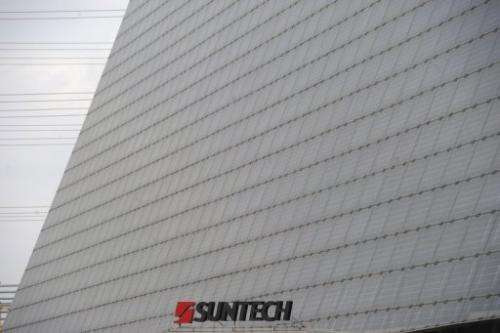Suntech announces default, search for financing (Update)

Suntech, one of the world's biggest solar panel manufacturers, said Monday it has defaulted on a $541 million bond payment in the latest sign of the financial squeeze on the struggling global solar industry.
Suntech Power Holdings Ltd.'s announcement was a severe setback for a company lauded by China's Communist government as a leader of efforts to make the country a center of the renewable energy industry. Its founder, Shi Zhengrong, became one of the industry's most prominent entrepreneurs and a billionaire, only to see most of his fortune evaporate as the company's share price plummeted.
The company is "exploring strategic alternatives with lenders and potential investors," David King, who replaced Shi as a CEO last year, said in a statement.
Suntech was due to make a $541 million bond payment on Friday but ran short of cash following heavy losses over the past year.
The company said it reached agreement with holders of 60 percent of the bonds to postpone payment but Monday's announcement said the bonds' trustee had declared a default. It said that triggered defaults on other debts to the International Finance Corp. and Chinese lenders.
"It is currently a very difficult time for our company and our industry, but the management and board of Suntech are committed to finding a way forward that will take into account the rights and interests of all of its constituents, including shareholders, note holders, lenders, customers, suppliers and employees," King said.
A sharp drop in solar panel prices over the last several years has erased the profits of solar panel makers around the world.
Suntech has also been hurt by a revelation in July that a business partner faked $680 million in collateral for a loan Suntech had guaranteed.
Suntech's U.S. shares tumbled in the days leading up to the debt deadline as fears rose that the company could be forced into bankruptcy. The stock, down nearly 80 percent in the past 12 months, dipped another 6 cents to close at 64 cents Monday.
Suntech said it is negotiating with note holders and other lenders in hopes of reaching a deal to restructure its debt. About 60 percent of the note holders agreed last week not to exercise their rights under the notes until May 15.
The company said it is unaware of any legal proceedings taken against it by any of its note holders.
China's solar producers have been battered by a glut of supply in the market brought on by their own government's efforts to promote the industry.
Lured by tax breaks and subsidies, hundreds of small Chinese producers piled into the industry and new arrivals were springing up as late as 2011, when weak demand and a supply glut forced producers to slash prices.
Other major Chinese producers including Yingli Green Energy Ltd., LDK Solar Co. and Trina Solar Ltd. have reported heavy losses. That has prompted expectations that the government will intervene and force companies to merge or shut down.
Prices of polysilicon wafers used to make solar cells plunged by 73 percent from 2010 to last year. The price of cells fell by 68 percent and that of modules by 57 percent.
Major manufacturers amassed debts of $17.5 billion, according to Maxim Group, a research firm in New York City.
Discover the latest in science, tech, and space with over 100,000 subscribers who rely on Phys.org for daily insights. Sign up for our free newsletter and get updates on breakthroughs, innovations, and research that matter—daily or weekly.
Deep-pocketed Korean conglomerates are moving into the solar industry, adding still more competition.
Chinese producers also have been hit with U.S. anti-dumping tariffs imposed to offset what Washington says are improper subsidies from Beijing. European solar producers also have filed anti-dumping complaints, with the European Union asking for higher tariffs on Chinese imports.
Shi has publicly criticized the tariffs, saying Suntech receives no improper government support.
Last week, Suntech announced the closure of its U.S. factory in Goodyear, Arizona, and the elimination of 43 jobs.
Forbes magazine estimated Shi's fortune at $2.9 billion at its peak in 2008. It said last year that it had tumbled to about $500 million as Suntech's share price plunged.
Copyright 2013 The Associated Press. All rights reserved. This material may not be published, broadcast, rewritten or redistributed.


















